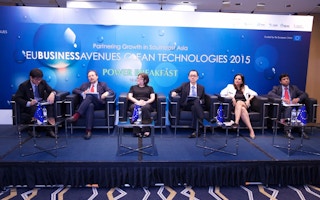Southeast Asia, home to 600 million people, is one of the world’s fastest growing regions with an economy that is expected to grow by 5.4 per cent annually between 2014 and 2018, according to the Organization for Economic Co-Operation and Development.
Balancing this progress with environmental sustainability will require the public and private sector to effectively manage challenges such as water and energy efficiency, waste minimisation, and pollution management.
This is a key area where European companies can work with their Asian counterparts to bring much-needed clean technologies to the region while simultaneously opening markets to new opportunities, said experts at a dialogue session organised by the European Union (EU) Delegation to Singapore on Tuesday.
Held at Suntec City Convention Centre and attended by 70 representatives from local companies and business organisations, the dialogue highlighted key sustainable development challenges that businesses from Europe and Southeast Asia could solve through collaborations when 40 European cleantech companies visit Singapore and Vietnam this June.
The companies will be participating in a business mission programme, EU Business Avenues, which brings small and medium enterprises (SMEs) from Europe to explore business opportunities in Asia. Launched last year and funded by the European Union, the programme has conducted two prior missions which have brought some 80 energy efficiency and interior design companies from 20 countries from across the European Union to the region.
The carefully selected companies visiting the region this June will showcase technologies for waste and water management, pollution control, and energy efficiency sectors, among others. They will be in Singapore from 16 to 17 June, and Vietnam from 18 to 19 June.
Dr Michael Pulch, EU ambassador to Singapore, told Eco-Business that the city-state is an important market for these companies to explore and an ideal hub from which to venture into the rest of the region. Singapore is one of the EU’s most important economic partners and this programme would help strengthen trade relationships between the two economies, said Ambassador Pulch.
”It will also help European SMEs bring the best of their sectors across to Singapore,” he noted.
“
The business proposition is for these companies to come to Singapore and explore the wider region.
Raffaele Quarto, Head of the economic and trade section, EU Delegation to Singapore
Raffaele Quarto, Head of the economic and trade section of the EU Delegation to Singapore, added that Singapore is a suitable as a first port-of-call for these companies, as “it is an advanced and developed economy and offers great opportunities as a market”.
“The business proposition is for these companies to come to Singapore and explore the wider region,” he said.
Officials from Singapore’s National Environment Agency, national water agency PUB, and renewable energy industry association who spoke at the event highlighted key national challenges which could be solved through collaboration with EU companies.
These included: reducing the amount of waste that ends up in landfills; recovering energy from waste water; promoting water efficiency; and scaling up the use of renewable energy such as solar and biomass.
Southeast Asian companies who are keen to explore collaborations in these areas can pre-arrange meetings with the visiting companies on these dates, or walk in at events that will be held at Singapore’s Suntec Convention Centre and Ho Chi Minh City’s Intercontinental Asiana Saigon hotel.
They can look forward to partnerships that will enable them to venture into the region’s growing economies, and open new business opportunities for manufacturing, sourcing, and creating demand in new markets, said Ambassador Pulch.
The programme format had already proven it could boost business for companies from both continents, said Quarto. In a similar series of trade missions to Japan and Korea under a scheme known as EU Gateway, “for every Euro we invested in this programme, we generated five Euros of additional business,” he said.
The EU and Singapore are also working on a free trade agreement, the text of which has been agreed and is in the process of being ratified by both parties, shared Quarto, adding that this would make collaborations even smoother.
Anand Nandakumar, of the Business Avenues programme, responsible for the coaching and training process for European companies, also highlighted that the programme offers Asian companies a chance to grow alongside their European counterparts.
A lot of the technologies being brought in by European companies are new to the market, “so you have the option of accessing these technologies and taking advantage of Singapore’s position as a regional hub,” he told companies in the audience.
“These are also small and medium sized companies, not large multinationals,” he said, meaning that both Asian and European SMEs participating in the programme would be closely matched in size and power.
“A partnership could help both parties grow together in the region”, said Nandakumar.
To arrange an individual business meeting with one or more EU companies which will be visiting Singapore and Vietnam, write to singaporeoffice@businessavenues.eu or call +65 6323 8782


















